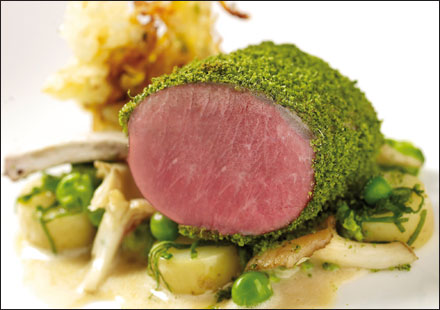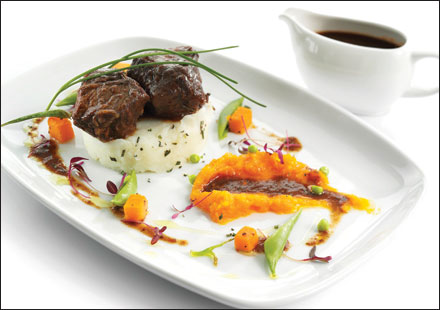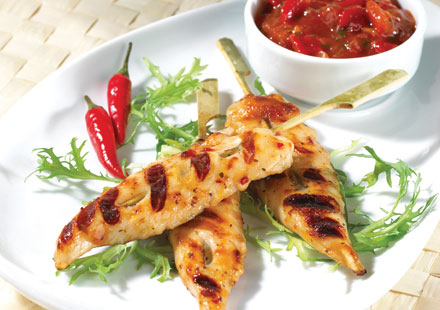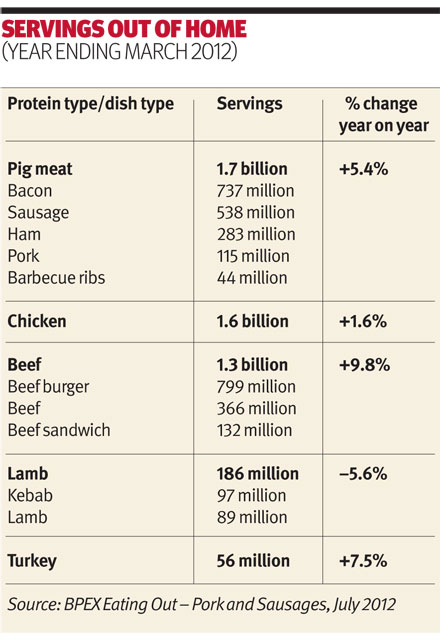Make the most of every morsel
With meat prices higher than ever, chefs have to innovate to ensure they are making the most of the precious protein. Angela Frewin explains how kitchens all over the country could expand their skill set
Meat prices, like everything else, continue to rise, forcing caterers to consider new ways of keeping their offer attractive to cash-strapped customers.
Suppliers say that beef prices, although stable, have hit a record high, while the cost of lamb has doubled over the past three years. Chicken and pig meat (pork costs on average 12% less than other red meats) remain the cheapest options, so it is unsurprising that they remain the most consumed meats out of the home.
But they are not immune to the inflationary forces. The cost of straw has soared from £20 to £70 a tonne, while the price of the wheat- and soya-based feed is coming under pressure from food speculation, currency exchange rates, growing demand from Asia and widespread drought across the Americas' wheat-producing regions.
Additionally, new welfare laws partially banning sow stalls from next January are expected to result in a drop in EU pig production that Tony Goodger, food service trade manager at BPEX (a subsidiary company of the Agriculture and Horticulture Development Board), believes will lift prices by about 10% from March 2013.
Some restaurants have responded to the squeeze by glitzing up lower-quality meat ingredients, observes Reg Johnson, director of Preston-based Goosnargh duckling and corn-fed chicken producer Johnson & Swarbrick. But there is no need to dilute food quality to ensure the price is right.
Goodger says trials to substitute 20% of the soya in pig feed (which soared from £250 to £400 per tonne in recent months) with domestically grown, protein-rich beans and pulses have proved successful - and it's a tactic some chefs have successfully adopted by offering pulse/animal protein combinations such as slow-roast loin of pork with white bean and grain mustard casserole or pork belly (now popular on many menus) with Puy lentils.
A meatier solution is to adopt the Fergus Henderson "nose-to-tail" approach and consider the growing choice of cheaper, lesser-known cuts. And don't make the mistake of equating cheaper with inferior, warns Tony Allen, chairman of family catering butcher Aubrey Allen.
Allen argues that all cuts from the same carcase are of equal quality (which stems from how the animal is bred, slaughtered and treated post-slaughter). It's just that some take more time and skill to turn into a delicious dish.
He finds it "ludicrous" that fillet of beef - perceived to be the prime beef cut - represents just 1.25% of the carcase weight but 20% of its value simply because it is tender and easy to grill. But attitudes are changing - Allen reckons there is no cut of beef he does not sell to restaurants now, where only 50% were accepted a decade ago. And he views this shift as the silver lining in the current recessionary storm clouds.
"In the boom times, chefs got a little blasé or lazy and they knew that whatever they paid for the price of food, they could pass it on and get it," he says. "Now people are having to think about the lesser-known cuts, they are having to use their skills and their artistry to produce something that is special. This greater creativity and innovation is going to breed, by default, better chefs, better butchers and better farmers."
Eblex (the English Beef and Lamb Executive) has thrown a well-received lifeline to caterers with the launch of 42 new cuts of lamb and beef - such as lamb neck fillet, goose skirt steak and prime hind shin muscle - designed for sous-vide cooking. Two examples using thick flank cuts - mini lamb roasting joints with a fennel and saffron marinade and mini beef roasting joints in a horseradish and chive marinade - are claimed to give a châteaubriand effect at a fraction of the price.
Eblex's salt marsh lamb recipe features one of 42 new cuts designed for sous-vide cooking
The cuts are seam-butchered to separate groups of muscles that share the same cooking characteristics for greater precision and consistency. Chefs just pop them in a vacuum-sealed bag and slow-cook at low temperatures in a water bath or combi-oven, which keeps them succulent and flavoursome. While some cuts cook quickly, others can take up to two days, so time-poor caterers could look to distributor Brakes' pre-cooked beef cheeks in red wine gravy meal that simply needs reheating. Cheaper alternatives can also be mixed with prime-priced cuts to keep prices down.
Samantha Douglas, meat and poultry merchandising manager at distributor Brakes, suggests combining expensive chicken breast with cheaper (but, she believes, tastier) chicken thigh, while some of Allen's customers are serving a trio of lamb - a faggot, a little shepherd's pie and a lamb cutlet. The cost to the chef is £3.50, against £7 for serving a rack of lamb. Bernard Matthews, meanwhile, has long banged the drum for substituting leaner and cheaper turkey meat in a host of popular dishes.
Brakes' pre-cooked braised beef cheeks in red wine sauce can help time-poor caterers
Offal is an under-valued sector that is coming back into its own, with liver, kidneys, chitterlings, brawn, easy-to-prepare faggots, pig heads and trotters all gaining in popularity.
While the opening of export markets to China - which places a much higher value on offal - means prices are likely to increase, this will not be prohibitive, adds Goodger.
Another way to save money is to think bigger than bespoke cuts. Chris Ince, executive chef at 7 Day Catering, buys a whole chicken for just 15% more than two chicken breasts to provide dishes of half-a-breast and a piece of leg or thigh - four portions instead of two. He adds that roasting the breast on the bone keeps it softer for sautés, braises, fricassees and flaked deli meat - and provides a well-roasted carcase for the stockpot.
Likewise, Douglas says that caterers can save money by cutting their own sirloin steaks from a whole strip loin, or buying a whole gammon to furnish steaks for the Sunday carvery and leftovers for gammon and pineapple or ham sandwiches during the week.
Plusfood's tomato and chilli skewers - a frozen and cheaper alternative to fresh
Poultry product supplier Plusfood also makes the case for buying frozen meats, which are cheaper than fresh and will reduce waste and simplify stock monitoring. Nigel Parkes, purchasing and marketing director at Atlantic Foods, adds that chefs can cut unit costs by reducing the number of lines they buy, but buying more of them - they can provide menu variety by using different sauces, rubs, glazes and marinades.
In these trying times, caterers need to be flexible with their menus to take advantage of the best deals of the day. "With the cost of ingredients at an all-time high and margins being squeezed ever tighter, it's more important than ever for you to speak with your supplier to find out which cuts currently offer the best value," advises Hugh Judd, food service project manager at Eblex.
Tips and trends
â- Processed supermarket "ham" has devalued the leg of pork, giving caterers the opportunity of serving a premium cut of cured pork leg at what appears to be a "discounted" price, advises Tony Allen, chairman of family catering butcher Aubrey Allen.
â- Sausages are the cheapest form of animal protein and are most popular served with gravy and mash, says BPEX. Brakes suggests holding sausage nights offering a selection of different varieties.
â- Beef burgers, a cheap alternative to steak, remain the most popular meat meal. Sliders - mini burgers made from 100% meat - are an emerging trend from the USA and Brakes will shortly launch a Slider trio that can be served with different buns and toppings.
â- Pork is gaining a wider profile from the rise of ethnic cuisines such as Mexican and Thai, where it is a popular choice. While few Indian restaurants offer pork, BPEX believes pubs could do well by marrying it with curry, another British favourite.
â- Meatballs, a school and hospital staple, are finding new fans in pubs where they are being served in new ways - in subs, or tapas-style with tomato and chorizo, for instance.
Contacts Atlantic Foods 01252 846500 www.atlanticfoods.co.uk
Aubrey Allen 024 7642 2222 www.aubreyallen.co.uk
Bernard Matthews Foodservice 0845 519 4097 www.bernardmatthewsfoodservice.co.uk
Brakes Foodservice 0845 606 9090 www.brake.co.uk
BPEX 024 7647 8809 www.bpex.org
Eblex 0800 781 4221 www.eblextrade.co.uk
Plusfood 01892 667155 www.plusfood.co.uk
Swarbick Johnson 01772 865251 www.jandsgoosnargh.co.uk














